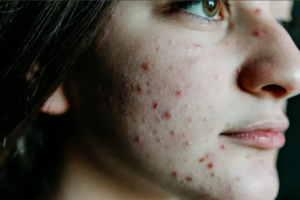Read Full Article HereCan Sweat Actually Improve Your Skin Health?
Unless you’re a sauna lover or old-school fitness enthusiast who wears trash bags when they run, sweat is likely more of an uncomfortable nuisance than something you’d ever seek out more of — but what if all that sweat was actually working wonders on your skin? According to dermatologists, that might be the case for this completely natural and misunderstood bodily function.
As it turns out, sweat isn’t just a recipe for pit stains, funky smells, and the dreaded clogged-pore-turned-pimple cycle. U.S. Dermatology Partners cite several benefits of sweat to the skin, including hydration, disinfection, and improved circulation. When pertaining to exercise as opposed to overheating or nerves, sweat can even offer anti-aging effects.
Could the fountain of youth really have been seeping out of our underarms and forehead this whole time? Yes and no. Here’s everything you need to know about sweat’s positive role on your skin (and certain perspiration habits to avoid).
The science behind your sweat
A study published in Temperature: Medical Physiology and Beyond took a deep dive into the body’s sweat and secretion glands, which include eccrine sweat glands, apocrine sweat glands, apoeccrine sweat glands, and sebaceous glands. Eccrine glands are the most prominent and responsible for our body’s sweat responses. Apocrine and apoeccrine glands also secrete sweat, but they’re limited to certain areas of the body and thus less associated with everyday perspiration.
The study also mentions sebaceous glands, which are responsible for the sebaceous filaments on your face you definitely shouldn’t be squeezing. While they don’t secrete sweat, sebaceous glands affect the makeup of the sweat that collects on the skin, particularly on the face and scalp, which plays a direct role in one of the sweat’s primary benefits: protecting the skin against harmful disease- and acne-causing microbes. The Temperature study states that eccrine sweat delivers antimicrobial peptides to the skin’s surface, including dermcidin, cathelicidin, and lactoferrin.
These peptides help eliminate and flush away unwanted bacteria, which can reduce acne breakouts, chronic skin condition flare-ups, and even infection, per U.S. Dermatology Partners. Moreover, USDP cites increased circulation as another benefit of sweat. As blood vessels dilate with the rise in core body temperature, blood flows more easily to the skin’s surface, creating a vibrant, flushed glow for younger-looking skin. (Psst: you can also improve skin circulation sans sweat by giving yourself a facial massage.)
The sweat, er, sweet elixir of youth
As board-certified dermatologist Dr. Michelle Henry told HuffPost, sweat is one of the most effective (and cheapest) anti-aging moisturizers on the market. Henry explains that allergens and dehydration can overstress the skin, making it difficult for skin cells to regenerate and recover. By reintroducing moisture to the skin’s surface and preventing allergens from permeating this barrier, sweat can keep our skin looking smooth, supple, and healthy.
In tandem with regular physical activity, sweat can also boost collagen production. Per U.S. Dermatology, skin visibly dulls, sags, and wrinkles thanks to changes in the inner and outer layers of the skin. Exercise manipulates the skin’s mitochondrial DNA to produce more skin-firming collagen and increases cell turnover rates to reveal fresher, more radiant skin. Paired with sweat’s natural moisturizing qualities, our perspiration packs a potent anti-aging punch.
Of course, there’s a reason so many of us hate to sweat. Too much of it can stink, cause skin irritations, and even reverse its potential benefits by clogging the pores (hello, sweat pimple breakouts) and promoting fungal growth (hello, athlete’s foot). While sweat certainly has its advantages, moderation is the name of the game. Cleansing the skin daily and wearing breathable fabrics can help the body reap sweat’s rewards — not rankness. So, the next time you feel your brow get a little damp, don’t worry. It’s doing more good than you think.
Can Sweat Actually Improve Your Skin Health?
May 30, 2023







